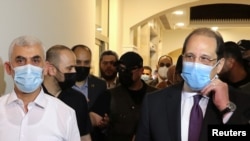A delegation of high-level mediators from Egypt met with their Israeli counterparts Friday in an effort to begin a new round of negotiations between Israel and Hamas as an Israeli offensive looms in Gaza's southern city of Rafah, along the border with Egypt.
Egypt's top intelligence official, Abbas Kamel, led the delegation to Israel to discuss a "new vision" for a prolonged cease-fire in Gaza, according to an Egyptian official who spoke on condition of anonymity with The Associated Press and Reuters because of the sensitive nature of the mission.
According to the official, Israel was willing to consider a limited truce in which 33 hostages held by Hamas would be exchanged for Palestinian prisoners. The truce also would help to move negotiations forward toward ending the war.
Israeli intelligence officials say there are 33 female, elderly and sick hostages left alive in Gaza, out of a total of 133 still being held by Hamas and other Palestinian militant groups, according to Israeli media reports.
The official said Friday’s talks focused initially on the limited exchange of hostages for Palestinian prisoners, as well as the return of a significant number of displaced Palestinians to their homes in northern Gaza.
Hamas said on Saturday that it had received Israel's official response to its position on the cease-fire talks and would study the proposal before submitting its response, according to Reuters news agency.
In a statement Friday, Hamas criticized a proposal from the United States and 17 other countries that it release all of its hostages as a pathway to end the crisis in Gaza, saying it failed to address Palestinian demands, a statement said.
Hamas is open to cease-fire ideas and sticks to its main demands outlined by the group, the statement added.
Hamas has said it will not back down from its demands for a permanent cease-fire and full withdrawal of Israeli troops, both of which Israel has rejected. Israel says it will continue military operations until Hamas is defeated and that it will retain a security presence in Gaza afterward.
Ahead of the talks, senior Hamas official Basem Naim told The Associated Press, "there is nothing new from our side," when asked about the negotiations.
Egypt has a vested interest in the negotiations because it is deeply concerned about an Israeli offensive into the southern city of Rafah. Such an offensive, Egypt fears, would lead to a potential influx of Palestinian refugees.
More than half of Rafah’s 2.3 million population is sheltering in this southern corner of the enclave after fleeing from other war-ravaged areas of the strip.
"The Egyptians are really picking up the mantle on this. Egypt wants to see progress, not least because it's worried about a prospective Rafah operation," the Egyptian official said.
Meanwhile, the Israeli military has mobilized dozens of tanks and armored vehicles in an area of southern Israel close to Rafah, apparently preparing for an invasion of the city.
Kamel, the head of Egypt’s General Intelligence Service, said ahead of the talks that he plans to make clear that Egypt "will not tolerate" Israel’s deployments of troops along that border, the Egyptian official said.
The official also said Egypt shared intelligence with the United States and European countries showing that a Rafah offensive would inflame the entire region.
Qatar, the previous main broker, increasingly has been excluded, according to the official, after failing to respond to Israeli demands to expel Hamas leaders from its territory or curb their finances.
"Qatar is still involved but in a lesser capacity," the official said. "It's clear to everyone they failed to deliver, even when it came to expelling Hamas or even shutting down their bank accounts."
As the war in Gaza drags on and casualties mount, there has been growing international pressure for Hamas and Israel to reach an agreement on a cease-fire.
On Wednesday, Egyptian President Abdel Fattah el-Sissi cautioned that an Israeli attack on Rafah would have "catastrophic consequences on the humanitarian situation in the strip, as well as the regional peace and security."
El-Sissi made these comments in a phone call with Prime Minister Mark Rutte of the Netherlands, the Egyptian leader’s office said.
Egypt also asserted that an attack on Rafah would violate the decades-old peace deal between Egypt and Israel.
The Israel-Hamas war was sparked by Hamas’ October 7 terror attack into southern Israel, in which militants killed about 1,200 people, mostly civilians, and took some 250 people as hostages. Israel says Hamas, designated a terror group, is still holding more than 100 hostages and the remains of more than 30 others.
More than 34,000 Palestinians have been killed in the war, according to Gaza health officials. The health ministry does not differentiate between combatants and civilians but says about two-thirds of the victims are children and women.
Some information for this report came from The Associated Press, Agence France-Presse and Reuters.







